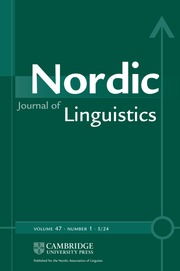Crossref Citations
This article has been cited by the following publications. This list is generated based on data provided by
Crossref.
Rieschild, Verna
2011.
Arabic yacni: Issues of semantic, pragmatic, and indexical translation equivalence.
Intercultural Pragmatics,
Vol. 8,
Issue. 3,
Küngas, Annika
2014.
Diachronic Corpus Pragmatics.
Vol. 243,
Issue. ,
p.
107.
Niemi, Jarkko
2015.
Combining clauses in interaction. The voi olla että ‘(it) may be that’ utterance in Finnish.
Journal of Pragmatics,
Vol. 77,
Issue. ,
p.
80.
Maschler, Yael
and
Schiffrin, Deborah
2015.
The Handbook of Discourse Analysis.
p.
189.
Helmer, Henrike
Reineke, Silke
and
Deppermann, Arnulf
2016.
A range of uses of negative epistemic constructions in German: ICH WEIß NICHT as a resource for dispreferred actions.
Journal of Pragmatics,
Vol. 106,
Issue. ,
p.
97.
Laury, Ritva
and
Helasvuo, Marja-Liisa
2016.
Disclaiming epistemic access with ‘know’ and ‘remember’ in Finnish.
Journal of Pragmatics,
Vol. 106,
Issue. ,
p.
80.
Lindström, Jan
Maschler, Yael
and
Pekarek Doehler, Simona
2016.
A cross-linguistic perspective on grammar and negative epistemics in talk-in-interaction.
Journal of Pragmatics,
Vol. 106,
Issue. ,
p.
72.
Weatherall, Ann
and
Keevallik, Leelo
2016.
When Claims of Understanding Are Less Than Affiliative.
Research on Language and Social Interaction,
Vol. 49,
Issue. 3,
p.
167.
Maschler, Yael
and
Miller Shapiro, Carmit
2016.
The role of prosody in the grammaticization of Hebrew naxon (‘right/true’): Synchronic and diachronic aspects.
Journal of Pragmatics,
Vol. 92,
Issue. ,
p.
43.
Polak-Yitzhaki, Hilla
and
Maschler, Yael
2016.
Disclaiming understanding? Hebrew ˈani lo mevin/a (‘I don’t understand’) in everyday conversation.
Journal of Pragmatics,
Vol. 106,
Issue. ,
p.
163.
Maschler, Yael
2017.
Pragmatic Markers, Discourse Markers and Modal Particles.
Vol. 186,
Issue. ,
p.
37.
Boas, Hans C.
2018.
Constructions in Contact.
Vol. 24,
Issue. ,
p.
253.
Pekarek Doehler, Simona
Maschler, Yael
Keevallik, Leelo
and
Lindström, Jan
2020.
Emergent Syntax for Conversation.
Vol. 32,
Issue. ,
p.
1.
Lindström, Liina
Pilvik, Maarja-Liisa
and
Plado, Helen
2021.
Variation in negation in Seto.
Studies in Language,
Vol. 45,
Issue. 3,
p.
557.
Menichetti, Julia
Gerwing, Jennifer
Borghi, Lidia
Gulbrandsen, Pål
and
Vegni, Elena
2021.
Saying “I Don’t Know”: A Video-Based Study on Physicians’ Claims of No-Knowledge in Assisted Reproductive Technology Consultations.
Frontiers in Psychology,
Vol. 11,
Issue. ,
Polak-Yitzhaki, Hilla
and
Maschler, Yael
2023.
From lack of understanding to heightened engagement: A multimodal study of Hebrew ′ATA LO MEVIN ‘You don’t understand’.
Intercultural Pragmatics,
Vol. 20,
Issue. 5,
p.
521.




